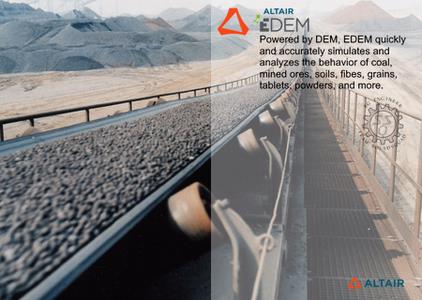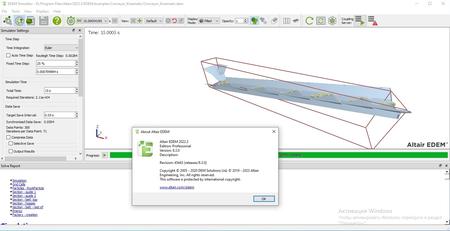Altair EDEM Professional 2022.3.0 Win x64
Author: softwarekeygencrack on 16-05-2023, 15:43, Views: 62
 Free Download Altair EDEM Professional 2022.3.0 | 1.1 GbProduct:
Free Download Altair EDEM Professional 2022.3.0 | 1.1 GbProduct:Altair EDEM
Version:2022.3.0 Professional
Supported Architectures:x64
Website Home Page :www.altairhyperworks.com
Languages Supported:english
System Requirements:Windows *
Size:1.1 Gb
Altair, a global technology company providing solutions in product development, high-performance computing and data analytics, is pleased to announce the availability of Altair EDEM 2022.3.0, the market leading Discrete Element Method (DEM) software for bulk and granular material simulation.
Altair EDEM 2022.3 Release Notes
Key Features
Export Data during simulation
Options have been added to allow the export of data throughout the simulation without the need to write out time step files. Queries can be defined in the Simulator, with a start time, end time and write out frequency. Multiple queries can be exported, with different settings. During the simulation, a single data file is written out per query. This can be used to get high frequency data from specific parts of a simulation without saving the whole simulation at a high frequency, or it can be used to run the entire simulation without saving any time-steps at all, whilst still obtaining specific key values.
Volume Packing
Volume Packing is supported on the EDEM GPU Solver (CUDA) which allows for significant performance improvements. Packed material beds which previously took hours to generate are now generated in minutes thanks to efficient utilization of state-of-the-art GPU technology.
The volume packing on the EDEM GPU Solver (CUDA) will allow packing of Multi�Sphere, Sphero-Cylinder and Polyhedral particles.The CPU version of volume packing has been updated to align with the GPU implementation. This will improve results, giving better packing with fewer iterations. It should be noted that cylindrical periodic boundaries are not handled by the volume packing feature on either the CPU or CUDA solvers, but if the volume packing geometry is contained within the active cylindrical wedge, then the simulation will still run correctly.
Intra-Particle Tablet Coating
An Intra-Particle tablet coating tool has been added to the EDEM Analyst. This tool can be used to perform extensive what-if analysis for tablet coating systems. The options allow definition of multiple sprays at different positions with different spray characteristics to see how effectively particles are being coated in each scenario. This is a post-processing functionality based on ray-tracing techniques, so the simulation does not need to be rerun to assess different configurations of sprays.The analysis produces a Description showing the distribution of the average coating on the different facets of the prototype particle.
Analyst
Video export defaults to Full HD resolution
The default frame width and height values in the analyst recording options have been updated to Full HD (1920x1080).
Triangle Area Available via Analyst
The area of geometry mesh elements has been added as an Analyst parameter. This can be used throughout the Analyst for coloring and data export.
Breakage post-processing analysis for open systems
Support for open systems has been added to the post-processing of the UFRJ Tavares breakage model. This means that systems which have a flow of particles through the simulation (leaving the domain) can be analyzed using the built-in breakage analysis tools.
Timestep selection dropdown
The dropdown navigation menu for time-steps in the Analyst has been improved to reduce how often the time-step is loaded. This will reduce the overhead when working with large simulations.
Solver
Preserve contact across geometry elements on CPU
An option to preserve contacts across geometry elements has been added to the CPU solver. This preserves the contact history between the particle and the geometry and eliminates the contact force spikes when a particle moves between elements. This option is already available on the Multi-Sphere CUDA solver.
Contact history preservation improved on CUDA
The method used by the CUDA solve to preserve contact history now accounts for gaps between two elements with a shared node. This is the same approach used in the new CPU implementation.
API
Improved CUDA solver speed with Custom Properties
Performance of simulations containing large numbers of custom properties have been improved when running on the EDEM GPU CUDA solver.
Coupling
CUDA data handling improvements in coupled simulations
The handling of data with the EDEM coupling interface has been enhanced. This will give improvements to the performance of coupled EDEM simulations.
Extend the behavior associated with getting Material names through the coupling
The behavior of the function getMaterialId has been updated to return the correct index for either a Bulk or Equipment material to resolve the incorrect index issue.
C based coupling
A C based coupling interface has been added to EDEM. This is a streamlined version of the C++ coupling interface, with functions added for controlling the simulation, setting up and modifying geometries and exchanging forces on the geometries. For full details on the available functions and setting up the coupling, please refer to EDEM's help documentation.
EDEMPy
EDEMpy functions for Sphero-Cylinders & Polyhedral particles
Methods have been added to EDEMpy to give compatibility with Sphero-Cylinder and Polyhedral particles. Sphero-Cylinder specific methods have been added for length, radius and positions. Methods for retrieving vertex positions have been added for Polyhedral particles.
EDEMpy: update deck open style from the 'with' format
EDEMpy scripts which modify a deck without the use of a Context Manager now print a warning instead of an exception. EDEMpy scripts should still use the format `with Deck('deck.dem') as deck` when opening the deck, however scripts not using this format will now run.
EDEMpy functions to set geometry as Physical, Virtual or a Dynamic Domain
The ability to find and set the Type of geometry has been added to EDEMpy. This allows python scripts to control whether a geometry is Physical, Virtual or Dynamic Domain. It is worth noting that the Dynamic Domain option is only applicable to geometries which are EDEM defined Boxes. This functionality has also changed the 'getType' function to 'getH5Index'. The method physical_type returns the type as a string ('Physical', 'Virtual') and type_name returns whether it is 'Cad_geometry' or 'box'.
EDEMpy set factory parameters
The `createFactory` method in EDEMpy has these additional optional (default None) parameters: fixedVelocity, randomVelocity, fixedAngVel, randomAngVel and fixedOrientation. These allow for greater control of factories.
System
Support for Windows 11
Support for Windows 11 has been added for EDEM. EDEM is able to be installed and run on Windows 11.
Other
EDEMCal using default python version
The Python Analysis option in EDEM Cal no longer requires installation of anaconda. Analysis can be done with just EDEM installed (using packaged python), there are no requirements for 3rd party installation. The python option can be used when files are generated and simulated locally or when they are generated for distributed simulation. When generated for distributed simulation, EDEMCal generates a batch file with the relevant python commands.
Bugs
EDEM 2022.3 contains fixes for the following issues:
- Geometry would not import via the Coupling Interface if no Equipment Material was defined in the simulation deck when the coupling was run from the command line.
- Particle orientation options would not accept orientations matrices to a higher number of decimal places.
- The Export input deck option 'ignore custom properties' did not work when the deck contained custom properties.
- The final timestep of the simulation was not saved properly when run using the Coupling Interface.
- Imported particle templates would not be renamed after the CAD file, despite the option being selected during the import process.
- CUDA GPU results would not indicate that the card was not supported.
- The Cylindrical Periodic Boundary planes could be altered when switching between Creator, Simulator and Analyst.
- Particles could sometimes disappear in the viewer when the particles were in a specific orientation.
- The Particle Size Distribution graph did not resize when the solve report was resized.
- The script used in the calibration kit for IPT analysis reported the wrong angle.
- PM-FlexTire in EDEM did not set vertex velocities, this will cause minor differences in results from previous versions.
- Simulation custom properties would not work on the CUDA solver if they were implemented only in the factory.
- Rendering of Sphero-Cylinders using transparency options did not appear correctly.
- The dynamic block factory would continue to generate material after the specified end time.
- The getTangentialOverlap function in the CUDA API was not consistent with other functions. This function is now deprecated and two new functions have been introduced. getTangOverlap and setTangOverlap.
- The getMaterialId() function was returning an incorrect index for the defined equipment materials.
- The newGeometry() coupling function defaults were incorrectly set.
- The renameGeometrySection() coupling function always returned false and was not sending a response message, with the result that the message queue could become corrupted.
- The Coupling's setDomainAutoUpdateFromGeometry(), always returned false in console mode, regardless of whether the call succeeded or not.
- The units displayed for solids density in the results section of the powders database did not match the input option, they are now set as g/ml.
- The Tavares UFRJ Breakage model parameters window would not close until valid entries were entered.
- Bulk materials and Equipment materials could be set to the same name as each other, causing conflicts in EDEM.
- Simulator Output Results Export Config dropdown wasn't set to the correct config when switching to the Simulator.
- The 'Volume Added' particle custom property that is used as part of the internal spray-coating model could not have values assigned in the particle factory.
- Geometries created with the edempy.Deck.Deck.createGeometry method were not correctly identified as being either an open or closed volume.
- It was not possible to move from Analyst to Creator or Simulator when a partial time step was selected.

EDEMis high-performance software for bulk and granular material simulation. Powered by state-of-the-art Discrete Element Modeling (DEM) technology, EDEM quickly and accurately simulates and analyzes the behavior of granular materials such as coal, mined ores, soils, fibers, grains, tablets, and powders. EDEM simulation provides engineers with crucial insight into how those materials will interact with their equipment during a range of operation and process conditions. EDEM is used for virtual testing of equipment that handles or processes bulk materials in the mining, equipment manufacturing and process industries. Companies worldwide use EDEM to optimize equipment design, increase productivity, reduce operational costs, shorten product development cycles and drive product innovation.
EDEM Applications Across Industries
Altairis a global technology company that provides software and cloud solutions in the areas of product development, high performance computing (HPC) and data analytics. Altair enables organizations across broad industry segments to compete more effectively in a connected world while creating a more sustainable future.
Buy Premium From My Links To Get Resumable Support,Max Speed & Support Me
Links are Interchangeable - Single Extraction
Comments


